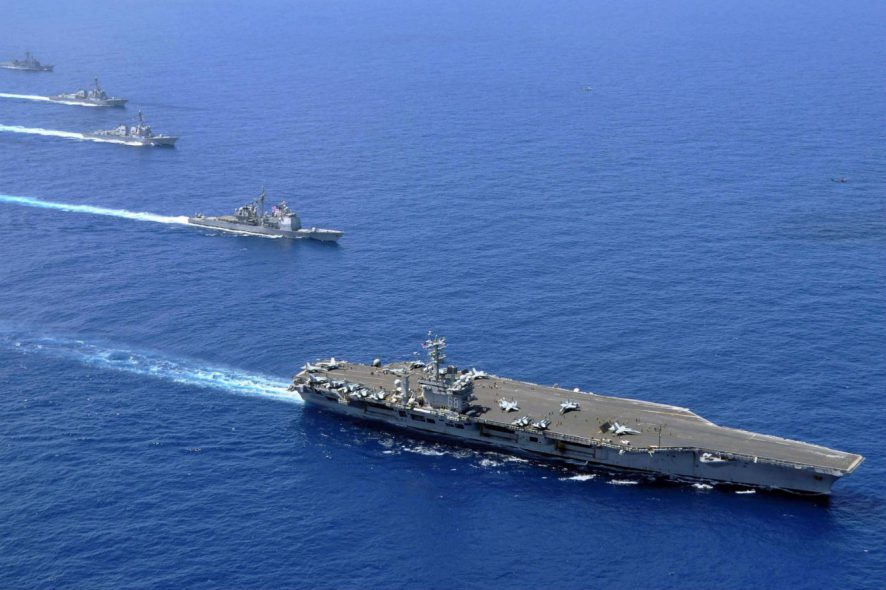Permanent Court of Arbitration: A five-judge tribunal constituted under the Permanent Court of Arbitration (“PCA”) in the case between Philippines and China gave its most awaited Award concerning the dispute in the South China Sea. This arbitration concerned disputes between the Parties regarding the legal basis of maritime rights in the South China Sea, the role of historical rights in the South China Sea, the status of certain geographic features in the South China Sea, and the lawfulness of certain actions of China that were alleged by the Philippines as violative of the Laws of Sea Convention
The Arbitral proceedings began in 2013, when Philippines brought an arbitration claim against China under Article 287 and Annex VII of United Nations Convention on the Law of the Sea (“UNCLOS”) before PCA. Since both countries are signatories to the UNCLOS, the legal issues raised revolved around the breach of the convention by China in the South China Sea. However, since the inception of the proceedings, China had blatantly refused to participate in the proceedings as it claimed that the Tribunal had no jurisdiction. Throughout the arbitral proceedings, China returned correspondence from the Tribunal sent by the Registry, reiterating on each occasion “that it does not accept the arbitration initiated by the Philippines.”
Nonetheless, the matter of jurisdiction raised by China was dealt by the tribunal under Article 288 which provides that in situations where jurisdictional dispute arises, the matter shall be settled by the tribunal. Accordingly, the Tribunal had dealt with the matter of jurisdiction and admissibility of Arbitration proceedings and held that it had jurisdiction in the present matter.
Philippines in its submissions put forth several major claims. Firstly, Philippines sought a declaration that China’s claim to rights within the ‘nine-dash line’ marked on Chinese maps are without lawful effect as permitted by UNCLOS. Historic rights claimed by China represented China’s view regarding its sovereignty over all maritime features within the well-known nine-dash line.
However, the Tribunal in the present judgment held that China’s historical rights were extinguished when UNCLOS was signed. Since, the rights are incompatible with the exclusive economic zones (“EEZ”) as provided in UNCLOS, China’s nine-dash line claim in the South China Sea is invalid. Not only the incompatibility with UNCLOS was highlighted but also the lack of evidence provided by China was held to be an important aspect of rejecting China’s claim of nine-dash line.
Second claim made was concerning the entitlements to maritime zones that would be generated under the Convention by Scarborough Shoal and certain maritime features in the Spratly Islands that are claimed by both the Philippines and China. Under UNCLOS, “[r]ocks which cannot sustain human habitation or economic life of their own”, submerged banks and low-tide elevations are incapable of generating any entitlements to EEZ of 200 nautical miles or continental shelf. To this, Philippine sought a declaration from the tribunal regarding absence of such entitlements claimed by China in the Spratly Islands, as well as Scarborough Shoal, as they fall in one or other category as mentioned above.
The tribunal on deciding the second claim made by Philippines based its reasoning on the objectivity of a feature to exist in natural condition and whether it can either sustain community of people or economic activity etc. And hence, on objectively analyzing the Spratly Islands, the tribunal held that none of the islands and reef like mischief reef, in question was capable of generating EEZs or continental shelf as claimed by China. Therefore, the tribunal declared that since none of the features are capable of generating EEZ, they are within the EEZ of the Philippines since those areas are not overlapped by any possible entitlement of China.
Thirdly, the Philippines sought declarations that China has violated the Convention (a) by interfering with the exercise of the Philippines’ rights mainly with respect to fishing and oil exploration; and (b) had failed in protecting and preserving the marine environment by tolerating and supporting Chinese fishermen in harvesting of endangered species.
The Tribunal held that since features like Mischief Reef do not possess EEZs due to submerging at high tide, the sovereignty lies with Philippines in regards to such entitlements. And on continuance of the reasoning laid down, it held that China had interfered with Philippines rights by prohibiting them to fish in Philippines EEZ, Philippines oil exploration at Reed Bank. China had restricted Philippine fishermen after May 2012 to exercise their traditional fishing rights at Scarborough Shoal. The tribunal, however, on duly recognizing the traditional fishing rights at Scarborough Shoal of fishermen of both China and Philippines nationality, noted that neither country could restrict any traditional fishing rights of the fishermen.
With regards to Philippines contention on China’s attempt in depleting marine environment of South China Sea, the tribunal observed that the ecosystem and habitat in the South China Sea had depleted and endangered species were being threatened. It was also realized by the tribunal that Chinese authorities had intentionally ignored the harm caused by Chinese fishermen to the endangered sea turtles, coral and giant clams by engaging themselves in harvesting activity. The failure in due diligence by Chinese authorities led to depletion and damage to the coral reefs in the South China Sea.
Not only China was held responsible for violating Philippines’s sovereign rights and International law in regards to its failure to protect the marine environment while creating artificial islands at Mischief Reef. But also was held responsible for not stopping Chinese fisherman from gathering endangered turtles etc. Also, the artificial islands constructed by China without any authorisation from Philippines violated Philippines’s sovereign right over its own territory. [South China Sea, In Re (Republic of the Philippines and The People’s Republic of China), 2016 SCC OnLine PCA 1, decided on July 12, 2016]






